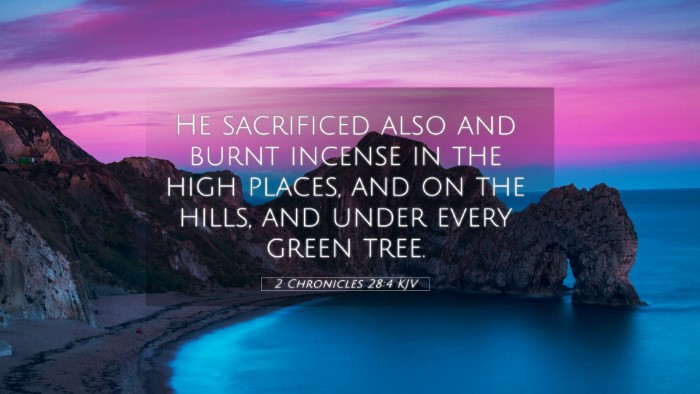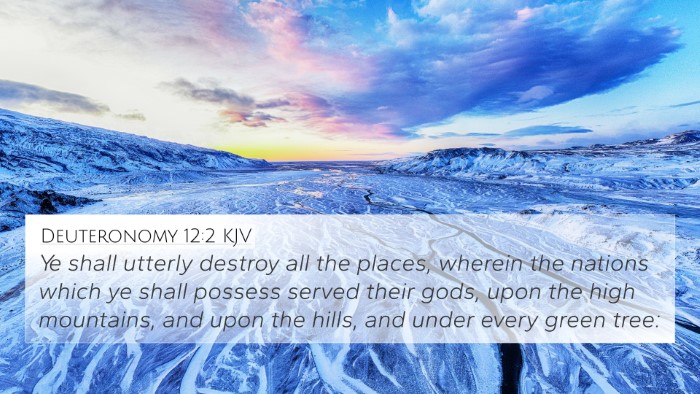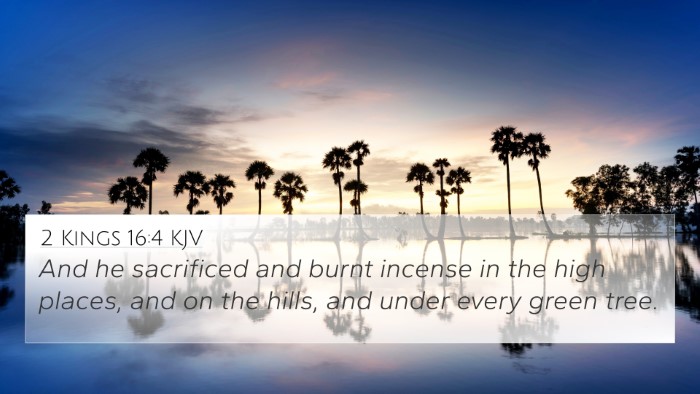Understanding 2 Chronicles 28:4
In the context of 2 Chronicles 28:4, we witness the actions of King Ahaz of Judah, who engaged in idol worship by burning incense on the high places, on the hills, and under every green tree. This verse highlights a pivotal moment reflecting the spiritual state of Judah during Ahaz's reign.
Summary of Meaning
This verse demonstrates the gravity of turning away from God and adopting the worship practices of surrounding nations. It serves as a warning about idolatry, illustrating both the personal and communal consequences of such actions. Ahaz's disregard for true worship led to significant turmoil within the kingdom, marking a decline in the spiritual integrity of Judah.
Commentary Insights
-
Matthew Henry:
Matthew Henry indicates that Ahaz’s actions were not merely a rebellion against God, but a deliberate choice to follow the customs of pagan nations. His choice to sacrifice to idols reveals not just disobedience but a betrayal of his covenant with God. The act of burning incense in high places symbolizes the height of obstinacy against the established worship of Yahweh.
-
Albert Barnes:
Albert Barnes explains that Judah had become increasingly corrupted under Ahaz's rule. The high places mentioned in this verse were often associated with the worship of false gods, leading the people away from their heritage. Barnes notes that this reflects a historical pattern of disobedience, where leaders influence the moral and spiritual direction of their nation.
-
Adam Clarke:
Adam Clarke provides insight into the specific locations of worship mentioned, emphasizing that these were sites of idol worship rather than the appointed places for worship of Yahweh. Ahaz's actions were not isolated; they were emblematic of broader societal decay and the dangers of syncretism, where true faith is diluted by mixing with pagan practices.
Cross-References and Thematic Connections
To grasp the depth of 2 Chronicles 28:4, it is essential to explore the following Bible verses that relate closely and provide a broader narrative context:
- 2 Kings 16:3-4: This passage parallels Ahaz’s idolatry and further explains his unfaithfulness towards God by indicating he followed the practices of the kings of Israel.
- 2 Chronicles 33:2: This verse recounts the reign of Manasseh, whose idolatry further demonstrates the importance of righteous leadership and its impact on a nation.
- Exodus 20:4-5: These verses solidify the commandments against idolatry, underscoring the foundational truth that God forbids worshipping other gods.
- Isaiah 1:29: Isaiah refers to those who turn away from the Lord, echoing the consequences of idolatry and highlighting the connection between sin and national calamity.
- Jeremiah 2:13: This verse illustrates Judah's forsaking of God, revealing a parallel to Ahaz's choices, showcasing systemic issues of abandonment of true faith.
- Ezekiel 14:6: The call to repentance from idolatry reinforces the need for people to turn back to God, reflecting the consequences faced by Judah in Ahaz's time.
- Romans 1:21-23: New Testament reflections on idolatry include explanations of the consequences of turning away from God, drawing a line from past to present moral decline.
Connecting Themes
The themes present in 2 Chronicles 28:4 resonate deeply throughout Scripture, particularly regarding:
- Idolatry: The continual warning against forsaking God for false idols is foundational to both the Old and New Testaments.
- Leadership Influence: The dichotomy of righteous versus unrighteous leadership has profound implications as seen in the lives of kings and their nations.
- Divine Judgment: The consequences faced by nations led by unfaithful leaders serve as a warning to future generations about the importance of fidelity to God's ways.
Conclusion
2 Chronicles 28:4 serves as an important lesson in the patterns of leadership, the perils of idolatry, and God's desire for a faithful people. By examining the cross-referenced verses and applying their teachings, readers can gain a richer understanding of biblical themes surrounding worship and its implications on society.
The inter-Biblical dialogue continues to shed light on the significance of Ahaz’s actions while inviting believers to maintain their commitment to Yahweh amidst a world filled with competing ideologies.





